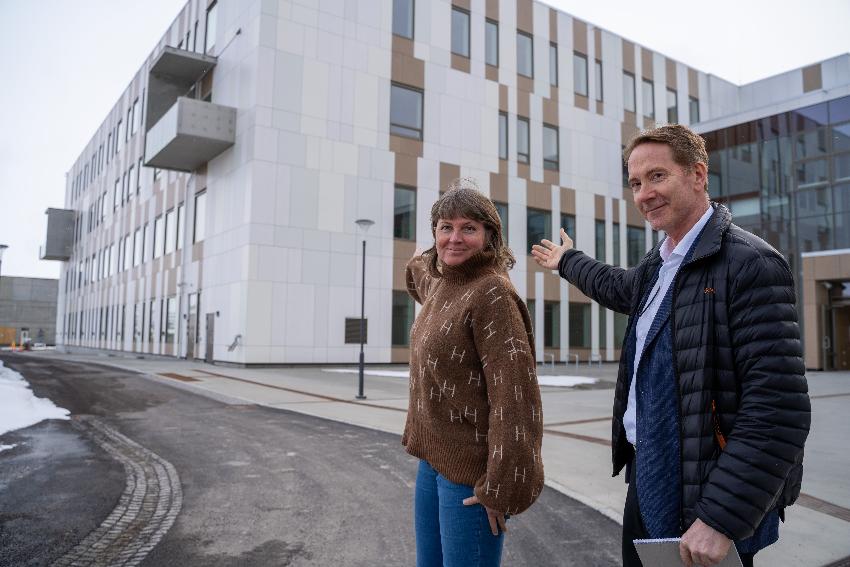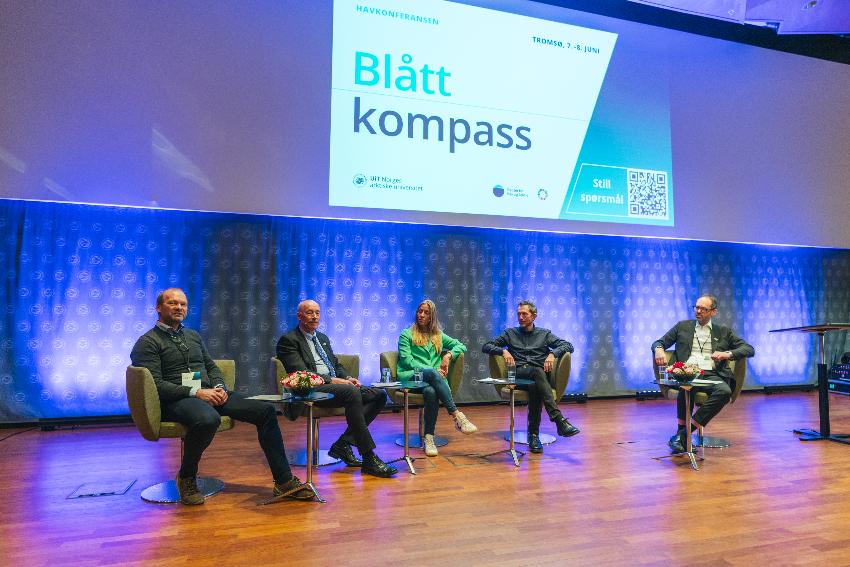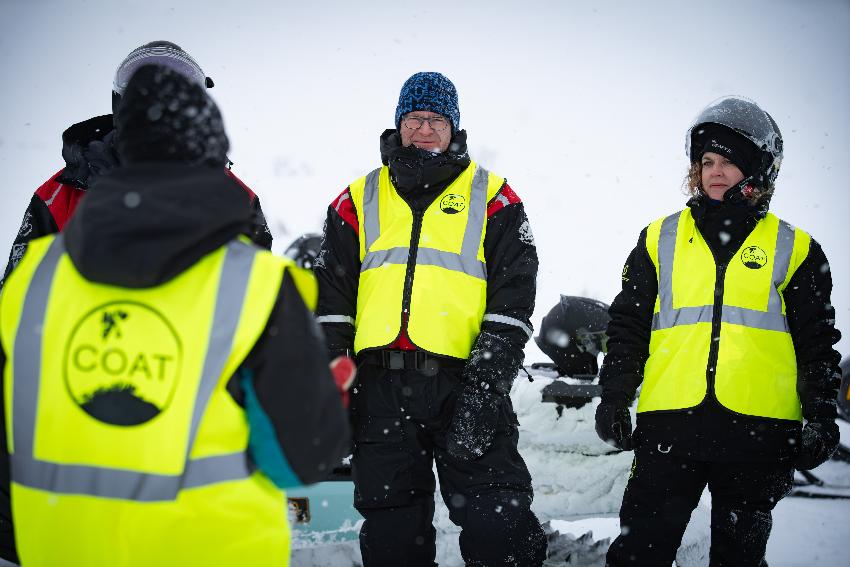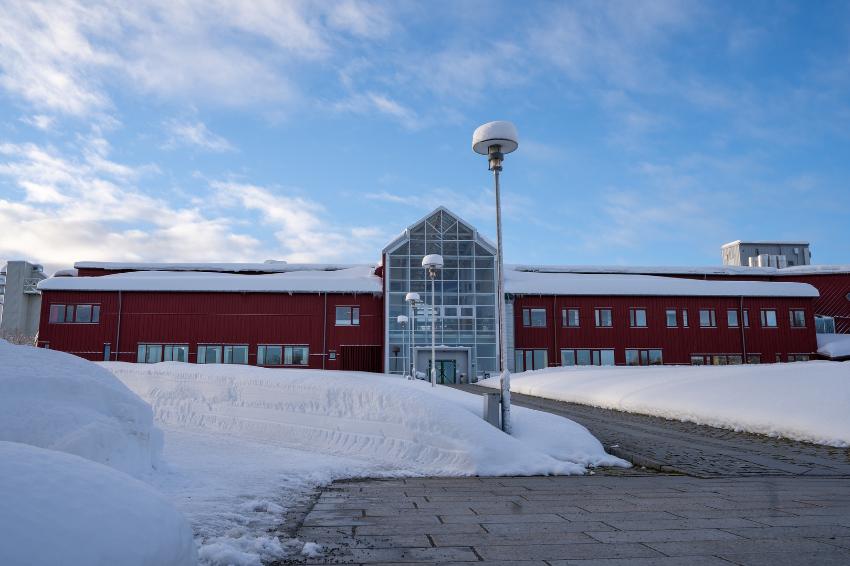Samler universitetsressursene i Arktis

Det norske kongeparet var tilstede i Oulu da prorektor Kenneth Ruud lanserte ”Joint Arctic Agenda”, et samarbeid mellom UiT Norges arktiske universitet, Luleå University of Technology, University of Oulu og University of Lapland.
Målet med avtalen er å samle kreftene og ressursene i Arktis i det globale kappløpet om utviklingen og ressursene i Arktis.
Den globale interessen for Arktis er formidabel og økende. Universitetene som nå har skrevet under avtalen, har vektlagt flere feltbasert på universitetenes ulike styrker. Samlet sett skal disse styrkene gi en tydeligere arktisk akademisk stemme.
Avtalen skal gi positiv utvikling gjennom dyktigere ansatte, mer forretningsutvikling, innovasjon og vekst.
Her er noen av satsingsområdene:
- Felles kurs- og utdanningsprogram vil gi dyktigere og mer internasjonalt orienterte studenter.
- Forskningssamarbeid innen velferdssamfunnets utfordringer, bedrifts- og økonomiutvikling med tanke på fornybar energi og industri som har høyeste miljøstandard.
- Mer samarbeid på tvers av landegrensene for å øke innovasjon. Forskningsmiljøene og markedene skal samarbeide mer.
- Kunnskapsutveksling gjennom flere møteplasser for å drive fram samarbeidet. Arctic Frontiers-konferansen i Tromsø trekkes fram som et godt eksempel til videreutvikling.
- Universitetene vil etablere en arbeidsgruppe som skal støtte, koordinere og følge opp avtalen ”Joint Arctic Agenda”.
Her er avtalen på engelsk:
Joint Arctic Agenda
Luleå University of Technology
UiT The Arctic University of Norway
University of Oulu
University of Lapland
Cooperating and sharing resources has been essential for survival since the first people settled in the Arctic. Similarly, our universities have a long history of collaborating within the framework of bilateral agreements.
In times of change and increasing globalization the rest of the world is showing growing interest in the Arctic and its resources. By joining forces within the framework of the Joint Arctic Agenda our universities will form an alliance that creates synergy that is needed in order to make our voice heard in a global context, and which will provide unique opportunities and added value for our students and faculty, as well as for our stakeholders and for the region as a whole.
Each of our universities has unique strengths and areas of expertise that we will bring to the table in the Joint Arctic Agenda;
The University of Oulu spearheads the following focus areas: sustainability through materials and systems, molecular and environmental basis for lifelong health, digital solutions in sensing and interactions, earth and near-space system and environmental change, understanding humans in change.
The University of Lapland, in line with its vision, will create, and be recognised for, an international profile as an Arctic and Northern science and art university. The University’s strategic profile is research on change in the Arctic and the North. The strategic focus areas of the university are sustainable development; law and justice; northern well-being, education and work; responsible tourism; and culture-centred service design.
Luleå University of Technology has a vision to contribute to a sustainable development and focuses on natural resources in the arctic region in areas such as mining and renewable energy, on research for a cold climate in e.g. construction, infrastructure and transportation, and on solutions for sparsely populated areas such as distance spanning solutions and health care.
UiT The Arctic University of Norway has as its overarching ambition to contribute to the overall development of the High North. We do this by engaging in research and education in a broad range of fields, but with a particular focus on Energy, climate, society and environment; Technology; Health, welfare and quality of life; Community development and democratisation; and Sustainable use of resources. Being located well above the Arctic Circle, our priorities often take on a Northern perspective, and as a consequence, we are Norway's largest university in Polar research.
All of our universities also recognize the shared responsibility that we have in promoting a development which safeguards Sami language, culture and quality of life. Research and education to ensure this will be a priority for us in the Joint Arctic Agenda.
Our ambition for the Joint Arctic Agenda is that it will increase the attractiveness of our universities and make our voices heard both nationally and internationally. We seek to accomplish this by building a common message and identity, and by delivering excellence in research, education and outreach. By pooling our resources, we will strengthen all our universities, and we will be more attractive to external partners.
When moving the Joint Arctic Agenda from the concept stage to actual, concrete collaboration, we will stimulate bottom-up driven collaboration in education, research and innovation in key areas that are of mutual interest to our universities. By building a sustainable model on these clearly defined areas of collaboration, we will seek to expand our partnership to cover new, emerging topics.
We will establish a working group with representatives from all four universities to support, coordinate and follow-up the execution of the activities that comprise the Joint Arctic Agenda.
We, the Rectors of Luleå University of Technology, UiT The Arctic University of Norway, University of Oulu, and University of Lapland hereby state as our Joint Arctic Agenda:
Education
We will work to develop new joint study programs based on courses and education resources from two or more of our universities. The study programs will be established in areas that are of common interest to our universities, and where we have unique competencies. In accordance with the Bologna process, we will explore possibilities for student exchange semesters between our universities in these programs. The students participating in these joint programs and exchanges will benefit from the expertise provided by each of the universities involved, and graduate with international experience, skills and know-how suited for Arctic needs.
Research Cooperation
We will find research-based solutions to joint problems faced by our societies. There are many commonalities between Finland, Sweden and Norway, and a highly developed, well-functioning welfare state is perhaps one of the most defining characteristics. The welfare state is, however, under considerable pressure. Although a large majority of the population in the Nordic countries enjoys a high standard of living, demographic changes will pose a challenge to many local communities and regions. Even in affluent societies, there are those who experience being marginalised.
To address many of these challenges we need to come up with creative solutions in e-health and telemedicine, social work, service design and care services for the elderly, etc. We also need to develop further key industrial and economic strengths in the Scandinavian Arctic; safe, and renewable energy, extractive industries that operate in accordance with the highest environmental standards. Research on legal structures and social justice related to the economic and industrial development is also needed in this respect.
To find the good solutions in all these areas, our four universities would benefit greatly from pooling our research capacities and our research infrastructure capacities. To this end, we will stimulate cross-disciplinary, and cross-institutional research initiatives. Furthermore, we will seek to coordinate the acquisition and use of expensive research infrastructure and promote its availability internationally, in order to increase the attractiveness and competitiveness of our region. The UArctic Research Infrastructure Catalogue will be a valuable tool to facilitate this.
Innovation
We will build an ”Arctic Corridor” within the framework of the Joint Arctic Agenda to better match innovations with businesses. All four universities have technology transfer offices / entrepreneurship hubs / business incubators / design centres etc. that are instrumental in bridging the gap between innovative research and the marketplace. Exchanging information on best practices will help all these units build competence, and increase their success rate.
Outreach, collaboration and capacity building
To reach the level of cross-institutional collaboration that The Joint Arctic Agenda aims for, concrete follow-up will be crucial. To this end we will take steps to facilitate meetings, conferences, workshops etc. aimed at moving the collaboration forward. In addition to dedicated meetings between our universities, follow-up within the framework of already established arenas and networks, such as the University of the Arctic, will be prioritised. Developing our collaboration within the framework of the UArctic will have the added benefit of making it relatively easy to bring in other partners, e.g. through Thematic Networks.
We will promote our common agenda to relevant stakeholders; policy makers, business actors, and the general public. To this end we will coordinate our activities on arenas where these different stakeholders meet. The Arctic Frontiers Conference in Tromsø is a prime example of such arenas.
Finally, we will support the Arctic Europe brand, aimed at ensuring positive development in the Scandinavian Arctic in a time of keen global competition for skilled labour, business investments, innovation and growth.



